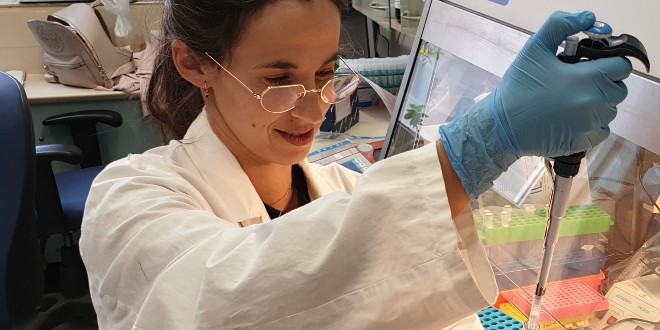Patients who have undergone biopsies to determine whether they suffer from infectious or autoimmune diseases or growths know that they are very unpleasant and painful.
Our immune systems work hard to keep us healthy and to protect us against bacteria, viruses, fungi, parasites and cancerous cells. When a patient’s immune system is weakened, he is at risk for diseases and dangerous infections; when they’re overactive, he is at risk for inflammation and autoimmune diseases – so accurate monitoring of immune systems’ activity is vital to health.
At present, the main way to test our immune system’s health is a blood test that counts immune (white blood) cells in the body. If the number comes out higher than normal, it may mean there’s an infection in the body that the immune system is fighting off. But these blood tests often fail to catch immune system activity in the body’s remote tissues, such as those found in bone marrow, lymph nodes and other organs. In those cases, patients must follow-up with invasive measures, such as biopsies and expensive and even potentially harmful imaging devices such as PET/CT scans and MRIs. And even then, such advanced testing doesn’t always detect the problem.
Now, scientists led by Hebrew University of Jerusalem (HUJI) MD/PhD student Ilana Fox-Fisher and Prof. Yuval Dor at the Institute for Medical Research-Israel Canada (IMRIC) have developed a novel method to monitor remote immune processes within those remote tissues and organs. The work, just published in journal eLife under the title “Remote immune processes revealed by immune-derived circulating cell-free DNA” relies on two basic biological principles. First, dying cells release fragments of DNA into the blood stream. Second, the DNA of each cell type contains a unique chemical pattern called methylation.
This term refers to a biochemical process involved in a wide range of bodily functions that is vital to our overall wellbeing. When it is out of balance, it could lead to many different health problems, but certain vitamins can help to support this process to function well.
In biological systems, methylation is catalyzed by enzymes; such methylation can be involved in modification of heavy metals, regulation of gene expression, regulation of protein function, and RNA processing.
When methylation is going well, the process helps repair the DNA, regulates hormones, produces energy, protects against cancer, supports detoxification, keeps the immune system healthy, supports the protective coating along your nerves, strengthens the nervous system and more.
Based on these principles, scientists can identify from which tissue the circulating fragments of DNA originated and determine the state of disease. For example, if a patient is battling breast cancer, there will be an elevation of DNA fragments deposited into the bloodstream after a cell dies that originate in breast cells and carry the methylation hallmarks of breast cells. The same is in effect for cardiac DNA fragments during heart attacks.
“These methylation markers allow us to monitor human immune cell dynamics and provide important information that isn’t accessible in standard blood cell counts,” explained Dor. “This novel tool can illuminate healthy and pathologic immune processes taking place deep within tissues, which are not accessible at present,” he added.
As part of their work, the researchers identified the specific DNA methylation patterns among immune and inflammatory cells types. This helped them detect DNA fragments that were deposited into the blood stream when those immune cells died. “A key finding is that immune-derived DNA fragments are not a simple reflection of circulating blood cells, but rather an accurate report of immune processes happening in the body,” explained Fox-Fisher. “Our research suggests that, in principle, doctors could monitor remote but critical immune processes by measuring the immune battle’s casualties, that is, immune-derived DNA fragments circulating in patients’ blood.”
The researchers tested their theory and proved the concept by testing several medical conditions in which the immune system is activated but standard blood cell counts are normal.
The first was with eosinophilic esophagitis (EoE), a chronic allergic disease that affects kids and adults and is often difficult to diagnose. To date, EoE diagnoses require invasive endoscopic biopsies because most patients’ blood counts come back normal. However, probing further, Dor’s team found that EoE patients’ blood contains abnormally high levels of DNA fragments from eosinophils (as identified by their unique DNA methylation pattern). ”Our new non-invasive blood test could go a long way in helping diagnosis and monitoring this disease,” added Fox-Fisher.
The team found similar success with lymphoma, a type of immune system cancer that usually doesn’t show up in blood tests. But the new blood test does pick up DNA fragments left by the immune system’s fight with lymphoma, without the need for bone marrow aspiration and further imaging. Fox-Fisher is now conducting a study of people who’ve been vaccinated against COVID-19 to see whether the levels of DNA released from antibody-producing B-cells increased after they received the vaccine.
“We’re hopeful this new blood test will give clinicians a more accurate picture of the state of their patient’s health, beyond the standard blood counts which often do not tell the whole story and frequently necessitate invasive follow-up tests and biopsies,” concluded Fox-Fisher.
The shortcode is missing a valid Donation Form ID attribute.




